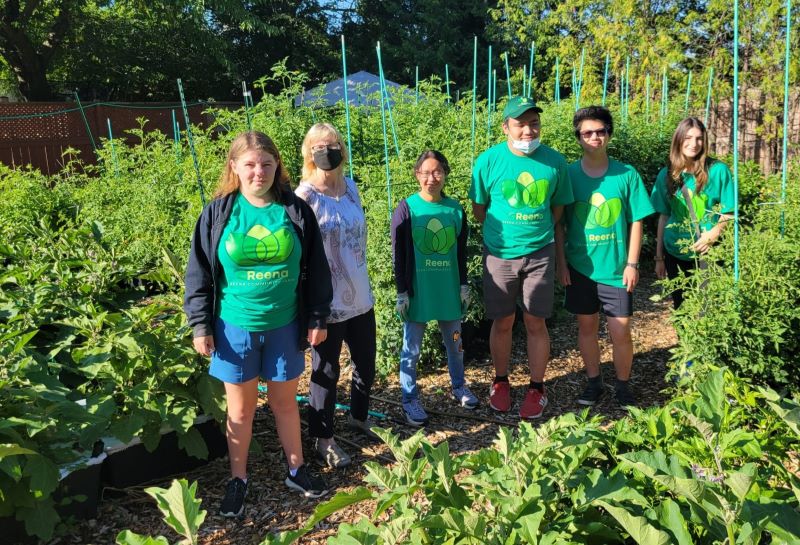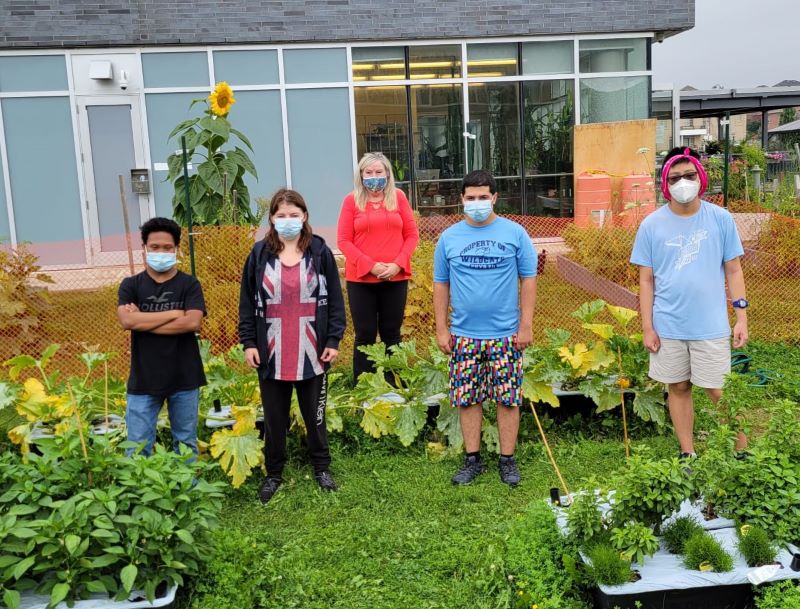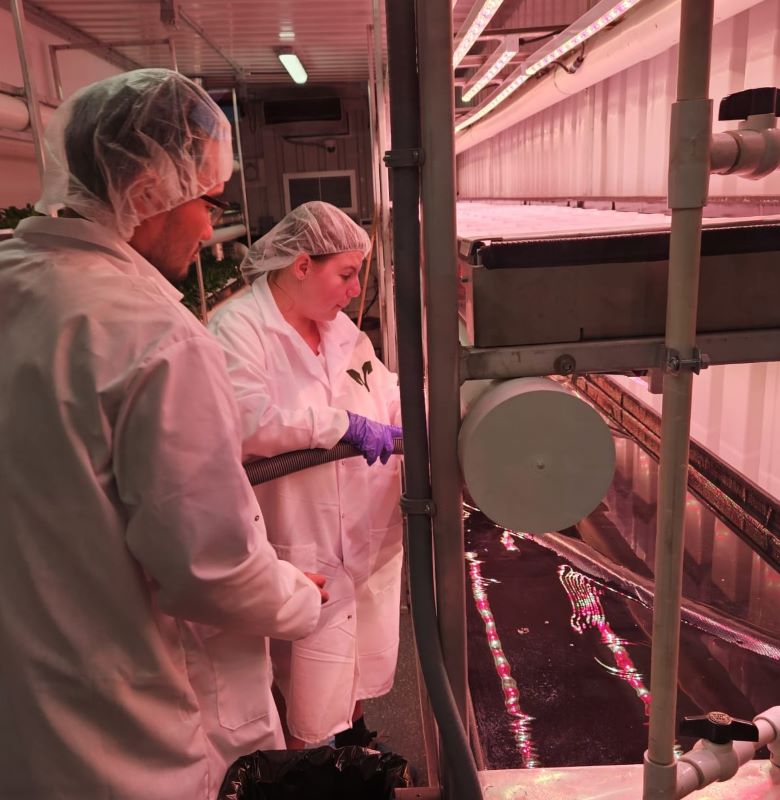Plant a seed and what do you get? A tree? A plant? A lush patch of grass? A seed in any form is full of potential. It can grow into many things—that's what it does best. So when Sophie Wood planted her first seed at the Reena Community Farm, she knew it would grow into a delicious fruit or vegetable. What she didn't know, however, was that something else would grow from that little seed: her confidence and independence.
The search begins

Sophie (left) stands with her coworkers in front of crops at the Reena Community Farm
Gardening was never more than a hobby to Sophie, one that she shared with her grandmother during their visits: "My grandma has a beautiful garden with herbs and tomatoes. I would often help her water the plants and pull weeds," Sophie recalls of the warm summer days in her grandmother's yard.
Watching the vegetables was always a delight, but it never occurred to Sophie that this could be a job. As self-described "indoor kid," growing vegetables was simply a fun way to spend some quality time with her family.
But as a soon-to-be high school graduate, Sophie needed to start thinking about her future. After spending hours looking through postings, it became clear that finding a job was a job in itself. She needed help navigating the whole system. One of her teachers encouraged her to apply for an employment transition program at Reena, an organization that supports individuals with developmental disabilities.
Reena, a space for communities to grow
An alternative to institutional care, Reena is a non-profit organization founded in 1973 by a group of parents of children with developmental disabilities. Reena currently offers supportive housing to 523 individuals and supports 1,000 people annually through a variety of outreach and day programs. Their goal is to promote independence, dignity, and inclusion for their members. In addition to housing, the organization also helps individuals with neurodiverse abilities find meaningful employment with the support of job coaches.
After polishing her resume and practicing interviews with her job coaches, the daunting process became more manageable. Soon enough, Sophie found herself in front of potential bosses, exploring a variety of workplaces and management styles. Each interview gave Sophie invaluable experience, but nothing quite stuck. Jobs are big deal, and she wanted something that could help her flourish for many years to come.
Fortunately, it just so happened that Reena was working on another project that would be a great fit—they just needed to get it growing.
The start of something new
While Sophie navigated the workforce after high school, the Reena team was planning an initiative that would increase food security in their supportive housing residences. Prior to the pandemic, individuals in these residences would shop for groceries and cook with help from support staff, gaining valuable skills to be self-sufficient. But with the world locking down, Reena needed a new way to safely support the members of their community. After partnering with another local non-profit to produce individually prepared meals, the staff at Reena began to think outside the box. Or rather, inside it.
In an effort to reduce the cost of meals, they put together a plan to grow their own produce using 400 above-ground planting containers. Instead of a plain grass lawn, the Reena team envisioned transforming their own backyard into an urban farm overflowing with tomatoes, beans, and zucchinis.
What started as a simple cost-saving measure soon bloomed into something bigger and more meaningful. The Reena team recognized that the farm could be something more, something that could help neurodiverse individuals learn agricultural skills and gain employment. But the dream of making a farm capable of feeding the Reena community would require a lot of resources, so the team applied for Agriculture and Agri-Food Canada's (AAFC) Local Food Infrastructure Fund (LFIF).
The Local Food Infrastructure Fund
The Local Food Infrastructure Fund (LFIF) is a 5-year, $70 million initiative ending March 31, 2024. The LFIF is aimed at community-based, not-for-profit organizations with a mission to reduce food insecurity by establishing and strengthening their local food system. Since it was first launched in August 2019, $54.8 million has been committed to support over 897 growth-generating food security projects across Canada.
As most gardeners know, the Victoria Day long weekend is the time to start planting seedlings. For the Reena team, it was a time to celebrate: their LFIF application was accepted! However, their joy was quickly followed by a scrambling chaos. Not only did they need to prepare the containers, but they also needed to find employees who could dedicate their full attention and care to the growing plants.

Sophie (second from left) stands in the Reena Community Farm with her coworkers.
What they needed was Sophie.
When Sophie's job coach told her about the farm crew job, she felt like this could be her chance to shine. She submitted an application and was invited to tour one of the farm sites.
"I was excited to go, but also nervous! I didn't know what was expected or if I could do it," says Sophie.
Seeing the farm in action reminded Sophie of gardening with her grandmother, but she still worried about how she would adjust from sitting in a classroom all day to working outside. While she had helped her grandmother with some simple garden tasks, the Reena farm was a lot more involved. Sophie would have to learn the entire process of growing from start to finish, a steep learning curve for all the new employees.
As it turned out, the best teacher she could have was practice.
Learning and growing
One sunny morning in July, Sophie waved goodbye as her mom dropped her off for her first day at the farm. Along with seven other students, she began working closely with the farm manager to start developing a green thumb. Mistakes were made, soil was spilled, pots were cracked, but her manager reassured her that it was all part of the process. Being surrounded by happy faces and positive attitudes made it easy to see errors as learning opportunities, and Sophie quickly adapted to the farm life. Who knew working could be so much fun?

Sophie (right) uses a hose to add water to a hydroponic container.
By the end of the summer, Sophie was an expert at staking tomatoes and picking the perfect eggplant. She even delivered produce to Reena's local partners—a kosher meal delivery service and a kosher restaurant—allowing more people to savour the produce grown just a few blocks away. "As I learned the jobs, I became more comfortable doing them. Pretty soon, I was trusted to do the tasks by myself," Sophie explains of her growing independence. "Working on the farm made me feel like I had achieved something good, and I helped people by giving them something they needed."
Sophie continues to work at the Reena Community Farm and has been with the organization with every change, transformation, and expansion. As the community farm grows, so too does Sophie, inspiring her to take on new responsibilities outside of the workplace. For example, the following year, Sophie researched bus routes and felt confident that she could commute to work alone. Her mother happily agreed.
Since 2021, the Reena team has added an indoor hydroponic farm uniquely designed to be wheelchair accessible and to keep leafy greens bug-free—an important part of achieving kosher certification. As one of the first students to work in the hydroponic farm, Sophie had to learn new skills and procedures to ensure the farm remained bug-free, a challenge she took in stride. Her hard work paid off when she was named Reena's 2023 Employee of the Year—an unexpected but very well-deserved honour. Now, equipped with her lab coat and newfound confidence, Sophie knows that she'll succeed wherever life takes her.
Get more Agri-info
- Want more stories like this? Explore what else Agri-info has to offer.
- Interested in reporting on this story? Contact AAFC Media Services at aafc.mediarelations-relationsmedias.aac@agr.gc.ca to arrange an interview with one of our experts.